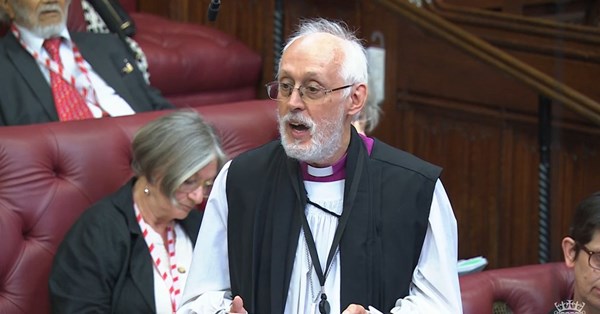THE Children’s Wellbeing and Schools Bill could “represent a step forward” in supporting families, the Bishop of Manchester, Dr David Walker, told the House of Lords last week.
The Bill, which is at its Second Reading, is sponsored by the Secretary of State for Education and Minister for Women and Equalities, Bridget Phillipson. The Lords debate on the Bill was moved by Baroness Smith of Malvern (Labour).
Baroness Smith said that the Bill would strengthen the safeguarding and welfare of children, expand free breakfast clubs in primary schools, provide greater support for care-leavers, regulate the use of care establishments and social-worker agencies, and “ensure that those in care have the security and stability they need to thrive”.
“This Bill makes vital, practical changes to our children’s social-care and education systems, and there will be tangible improvements for every young person as a result,” she said.
Reflecting on his own Private Member’s Bill, the Universal Credit (Standard Allowance Entitlement of Care Leavers) Bill (News 2 August 2024), which overlaps somewhat with the Children’s Wellbeing and Schools Bill, Dr Walker referred to research undertaken by Barnardo’s, which found that “39 per cent of care-leavers aged 19 to 21 are not in education, employment or training, compared with 13 per cent of young people in general.”
In the UK, a care-leaver is a young person aged between 16 and 25 who has been in the care of the Local Authority for at least 13 weeks and was in care on or after their 16th birthday.
Dr Walker told peers that the care-leavers whom he had met though Barnardo’s emphasised that much depended on the whim of their particular local authority.
“Young people who move away for work or further education are especially prone to losing support. We need a universal offer for young people leaving care that local authorities are obliged to meet,” he said.
Baroness Benjamin (Liberal Democrats), who is the vice-president of Barnardo’s, said: “Every year, some 13,000 young people leave care without the support they need. Outcomes for these young people remain much lower than for their peers.
“We believe there should be a new minimum standard of support for care leavers — a national offer regardless of where they live, which should include measures recommended by Barnardo’s.”
Baroness Benjamin, who is also a patron of the charity First Star Scholars, said that she wanted to work with the Government to develop a programme to enable more care-leavers to succeed in higher education.
The Earl of Effingham, Lord Howard (Conservative), welcomed the Bill, but said that “there are areas in Part 1 where we will seek to probe, develop and clarify the practical implementation.”
Although Lord Howard said that he was “keen to see support for care leavers be as effective as possible”, he disagreed with the Bill’s handling of academies: “They seek to undo the progress made during the last two decades”.
Baroness Morgan of Cotes (Non-Affiliated), who was the Secretary of State for Education and Minister for Women and Equalities from 2014 to 2016, had an observation to make about academies, referring to Clauses 47 and 50 of the Bill.
She asked the peers: “If academisation is not the answer in particular situations, then what is? How is school improvement, which has, after all, been the holy grail of Governments over many decades, going to be achieved and who does that most affectively?”
The Bishop of Derby, the Rt Revd Libby Lane, who chairs the board of trustees of the Children’s Society, registered her support for better data-sharing to protect children, including with and from faith communities.
She said: “We know that schools across England are already engaged in excellent anti-poverty, anti-racist and anti-neglect work, for example. As we have heard, some are already benefitting from collecting and monitoring well-being data to inform their interventions. I trust we can agree that there is value in equipping schools with a comprehensive picture of the well-being of their students.”
Bishop Lane also commended the provisions to reduce the cost of school uniforms and to expand the availability of free school breakfasts: “Poverty is a primary factor in the well-being of children.
“I suggest that children themselves are best placed to advise us of the challenges they face and of what would make life better.
In her concluding speech, Baroness Smith said: “We are committed to building a system that removes the obstacles to learning that hold too many children back, with all reforms underpinned by clear and robust accountability.
“The Bill includes many measures to keep children safe and prioritise their well-being, and I am glad that they have been widely welcomed across the House.”
The Bill now moves to Committee Stage.

















